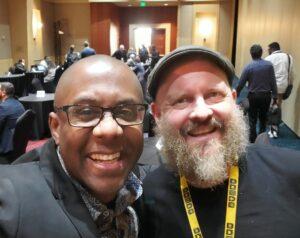Every business has to start somewhere, and for many entrepreneurs, that “somewhere” involves a lot of sweat equity that isn’t for the faint of heart. Often, startups must bootstrap their way to success — starting out on kitchen tables and in garages as they bring their ideas to fruition. That’s the beauty (and the beast) of entrepreneurship, and it’s what gets most founders out of bed in the morning, excited to tackle each day.
In a candid conversation with small business expert and publisher of ZoneofGenius.com, Ramon Ray, Yossi Mlynsky, the founder behind Upstack, shares lessons and insights that go beyond software development and venture strategies.
Ramon interviewed Yossi on the occasion of Zoho Day.
Zoho is a leading provider of solutions for businesses – from social media marketing, to CRM, to HR management, accounting and more.
Related article: – 5 Ways To Start Your Business With No Outside Funding(Opens in a new browser tab)

Master Communication for Global Impact
Mlynsky underscores the role of effective communication in software development. Building a network of global collaborators requires not just technical prowess but also the ability to convey ideas clearly.
Key takeaway: Use communication as a tool for global impact, fostering collaboration, understanding, and synergy among a diverse team of professionals. Areas of focus may include:
- Cultural awareness training: Invest in cultural awareness training to understand nuances in communication styles across different cultures. Sensitize yourself to cultural differences in non-verbal cues, tone, and communication preferences.
- Language proficiency: If working with a global team, consider language proficiency courses to improve communication skills in commonly used languages. Leverage language learning apps, online courses, or language exchange programs to enhance proficiency.
- Virtual communication tools: Familiarize yourself with various virtual communication tools and platforms. Explore videoconferencing, instant messaging, and collaborative platforms to enhance real-time communication and project collaboration.
- Clear messaging: Cultivate the ability to convey complex ideas clearly and concisely. Avoid jargon or language that may be misunderstood so your message resonates with a diverse audience.
- Active listening skills: Practice active listening during team meetings and discussions.
Encourage team members to express themselves, and ensure their perspectives are heard and acknowledged.
Related article – How To Fund Your Business In A Tough Market(Opens in a new browser tab)
Embrace Remote Work
Upstack’s early adoption of remote work showcases Mlynsky’s foresight. Follow his lead by recognizing trends and seizing opportunities to source global talent.
Key takeaway: Embrace the flexibility remote work offers in a digital era by focusing on the following:
- Flexible work policies: Establish flexible work policies that accommodate remote work options. Empower team members to balance work and personal life by embracing a results-oriented approach.
- Up-to-date technology: Invest in cutting-edge communication and collaboration tools. Utilize videoconferencing, project management, and messaging platforms to facilitate seamless remote collaboration.
- Remote-friendly culture: Foster a culture that values and supports remote work. Encourage open communication and inclusivity, ensuring remote team members feel connected and engaged.
- Outcome-based performance metrics: Shift focus from time-based metrics to outcome-based performance evaluations. Evaluate team members based on deliverables and results rather than traditional office hours.
- Global talent acquisition: Embrace the opportunity to tap into a global talent pool. Explore hiring talent from diverse geographical locations to bring varied perspectives and skills to your team.
Related article – Building a Business from Scratch: Using Community for Growth (Opens in a new browser tab)
Perseverance as the Cornerstone
Entrepreneurs face setbacks, but the key is to view them as stepping stones, not stumbling blocks. Success is often a journey of persistence, learning, and adapting.
Key takeaway: Keep your chin up during challenging times with the following strategies:
- Mindset shift: Embrace a growth mindset that perceives challenges as opportunities for learning and growth. Cultivate resilience by reframing setbacks as valuable experiences that contribute to your entrepreneurial journey.
- Continuous learning: Invest in continuous learning and skill development. Equip yourself with the knowledge and skills needed to navigate obstacles, ensuring you remain agile in a dynamic business environment.
- Networking and mentorship: Build a robust network of mentors and fellow entrepreneurs. Seek guidance from those who have weathered similar storms, gaining insights and perspectives that can illuminate your path forward.
- Adaptability and agility: Foster a culture of adaptability within your business. Embrace change and be agile in responding to market shifts, technological advancements, and evolving customer needs.
- Celebrate small wins: Acknowledge and celebrate small victories along the way. Break down large goals into smaller, achievable milestones, providing a sense of accomplishment and motivation during challenging phases.
Bootstrapping Challenges and Triumphs
Mlynsky emphasizes that bootstrapping can be a great way to test your idea in the marketplace without burning through money — helping you avoid going to market with an unproven concept. He offers the example of a would-be entrepreneur who came to him with visions of building a laundry delivery app. “I was like, ‘Why don’t you just get a 1-800 number, put it up on Craigslist or put some flyers in people’s letter boxes, go to the local laundromat and do some deliveries, and see what happens?’” says Mlynsky.
Key takeaway: Recognize that bootstrapping demands creativity, adaptability, and resourcefulness. Bootstrap your way to success with these tactics:
- Lean operations: Streamline business operations to eliminate unnecessary expenses. Adopt a lean approach, focusing on essential functions to optimize resources.
- DIY marketing: Harness the power of do-it-yourself marketing strategies. Utilize grassroots marketing tools, social media platforms, and content creation to build brand visibility.
- Strategic partnerships: Forge partnerships to share resources and expand reach. Collaborate with complementary businesses to create mutually beneficial alliances that enhance both parties’ capabilities.
- Iterative product development: Embrace iterative product development to minimize upfront costs. Launch a minimum viable product (MVP) and gather user feedback for incremental improvements, ensuring efficient use of resources.
- Customer-centric approach: Prioritize a customer-centric approach to guide business decisions. Build strong relationships with customers to foster loyalty and gain valuable insights for refining products or services.
Navigating Entrepreneurship: Insights from Upstack’s Success
Mlynsky’s story isn’t just about Upstack’s success; it’s about communicating with people effectively, being smart about changes, staying strong when things get tough, and figuring out how to make things work without tons of money.
There’s a purpose behind these entrepreneurial tenets, one that goes back to the whole purpose behind starting a business — not only fulfilling a dream but also having something to show for it. In Mlynsky’s words, “It is really encouraging now that bootstrapping is back in fashion. And profitability is back in fashion — actually making money, right?”
As you venture into your own business journey, remember success is about more than reaching a goal; it’s about being strong, clever, and tenacious — and making a profit along the way.
To learn more about Mlynsky and his bootstrapping tips, follow him on LinkedIn.












